 Looneyville Criminal Lawyers, West Virginia
Looneyville Criminal Lawyers, West Virginia
Sponsored Lawyers
1-10 of 18 matches
Accident & Injury, Personal Injury, Divorce & Family Law, Criminal
Whether you have suffered an accident while on the job or suffered an injury during a car accident or semi truck accident, The Law Offices of Claude S. Smith III devote personal attention to your case. Our attorney and legal staff understand the pressure and emotional stress experienced by those involved in legal cases. We strive to bring personalized attention and care to every single client.
(more)Accident & Injury, Criminal, Bankruptcy & Debt, Family Law, Trusts
Ron has, over the last decade, assisted clients by planning and designing settlements to address future needs and ensure any government benefits are protected. He has been involved in settlements involving personal injury, workers’ compensation, and employment-related claims. Ron’s consulting and legal services also include providing economic expert witness work, reducing future claimed damages to present value, and advising on work-life expectancy. Our firm brings a unique perspective and approach to law: after more than a decade of advising clients on financial matters, we decided our firm would focus on areas of financial law. This is why bankruptcy, trusts, and tax law are our major focus areas. Of course, we are happy to discuss and assist you with all your legal needs. We aim to be accessible and able to provide personal attention to every client we work with.
(more)White Collar Crime, Education, Immigration, Employment, International
Kendra L. Bunn is a Jacksonville, Florida-based immigration attorney and the founder of the Law Offices of Kendra L. Bunn, P.A., established in 2002. With over two decades of experience, she specializes in immigration law, including visa applications, investor applications, business work visas and family-based petitions. Her firm serves clients throughout Florida and has expanded to the Midwest, with offices in Marietta, Ohio, and Athens, Ohio. Ms. Bunn is recognized for her leadership in the legal community. She was one of the first female attorneys to practice immigration law in North Florida and has held significant roles such as the National Liaison to the USCIS Jacksonville Office, AILA Director of National Citizenship Day in Jacksonville, and National Mentor in the areas of F-1 students, researchers, and international faculty in higher education. Her Florida offices are located at 4720 Salisbury Rd, Jacksonville, FL 32256, and she offers services in multiple languages, including English, Serbo-Croatian, Macedonian, Russian, and Italian. Her Midwest offices are conveniently located between Columbus, Ohio and Pittsburgh, Pennsylvania, serving all of Ohio and Western Pennsylvania. In addition to her legal work, Ms. Bunn is involved in community service. She and her family are active members of the Christian Family Chapel in Mandarin, Jacksonville, Florida. She also volunteers frequently with many sports groups in town, while chasing around her two very busy and active children!
(more)







